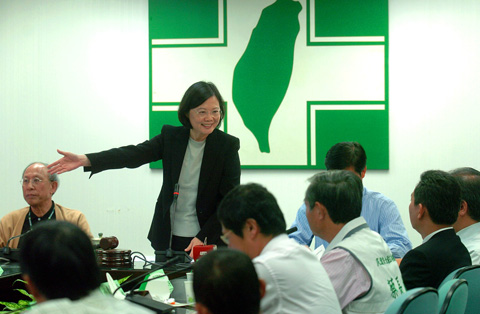Democratic Progressive Party (DPP) Chairwoman Tsai Ing-wen (蔡英文) yesterday hit back at the Presidential Office for painting and criticizing her as an independence fundamentalist.
Tsai said that the Presidential Office overly simplified her remarks in an interview, which appeared in three Chinese-language newspapers yesterday, and that she had just asked President Ma Ying-jeou (馬英九) a few questions.
“I just asked a few questions and I would like to see him answer them,” she said. “It is not a good idea to stick a label on other people.”

PHOTO: CHIEN JUNG-FONG, TAIPEI TIMES
In the interviews, Tsai criticized Ma for failing to mention in his inaugural address that Taiwan’s 23 million people have the final say on the nation’s future.
In response, an official at the Presidential Office said there was no need to mention it because it is a fact that Taiwanese have a say on the country’s future because they can elect legislators and presidents.
She also criticized the Ma administration for retreating on the issue of sovereignty. She said she would like to know why the administration wanted to resume cross-strait negotiations based on the so-called “1992 consensus,” without clarifying what the consensus refers to.
Tsai said the administration has now chosen to keep mum on the KMT’s previous contention that the so-called consensus refers to “one China, with each side having its own interpretation.”
Tsai said that the Ma government’s plan to apply for WHO membership under the name “Chinese Taipei” without undertaking political negotiations was unacceptable and a step backward.
The Presidential Office retorted by saying that the officials documents of the WTO refer to the country as “Chinese Taipei” and the country did not gain accession to the international body until 2002 when Chen Shui-bian (陳水扁) was president.
Tsai said yesterday that the details of the WTO application were decided by the then-KMT administration and the DPP administration was not responsible for them.
Tsai also met the heads of local chapters of the DPP in Taipei yesterday. After listening to their opinions, Tsai instructed the party’s Department of Organizational Development to conduct a census of party members as part of its efforts to reform the party following its defeat in the legislative and presidential elections earlier this year.
Tsai called for unity at the party meet yesterday, saying the party was just starting its uphill climb to initiate changes.
Charter bosses attending the meeting reached a consensus that party members should refrain from attacking each other.
In other news, the DPP’s Party Reform Task Force held its first meeting yesterday and decided to propose a reform package on June 18 so it can be ready for debate at the party’s National Congress on July 20.
DPP Secretary-General Wang Tuoh (王拓), who also serves as the convener of the task force, said the nine-member group would discuss three main issues: revision of the party platform, discipline and evaluation and nomination process.
Lin Chia-lung (林佳龍), a member of the task force, said that with Tsai as the party’s new leader, the priorities are to reshape the image of the party and to settle the nomination for next year’s local chief elections as soon as possible.

Alain Robert, known as the "French Spider-Man," praised Alex Honnold as exceptionally well-prepared after the US climber completed a free solo ascent of Taipei 101 yesterday. Robert said Honnold's ascent of the 508m-tall skyscraper in just more than one-and-a-half hours without using safety ropes or equipment was a remarkable achievement. "This is my life," he said in an interview conducted in French, adding that he liked the feeling of being "on the edge of danger." The 63-year-old Frenchman climbed Taipei 101 using ropes in December 2004, taking about four hours to reach the top. On a one-to-10 scale of difficulty, Robert said Taipei 101

A preclearance service to facilitate entry for people traveling to select airports in Japan would be available from Thursday next week to Feb. 25 at Taiwan Taoyuan International Airport, Taoyuan International Airport Corp (TIAC) said on Tuesday. The service was first made available to Taiwanese travelers throughout the winter vacation of 2024 and during the Lunar New Year holiday. In addition to flights to the Japanese cities of Hakodate, Asahikawa, Akita, Sendai, Niigata, Okayama, Takamatsu, Kumamoto and Kagoshima, the service would be available to travelers to Kobe and Oita. The service can be accessed by passengers of 15 flight routes operated by

Taiwanese and US defense groups are collaborating to introduce deployable, semi-autonomous manufacturing systems for drones and components in a boost to the nation’s supply chain resilience. Taiwan’s G-Tech Optroelectronics Corp subsidiary GTOC and the US’ Aerkomm Inc on Friday announced an agreement with fellow US-based Firestorm Lab to adopt the latter’s xCell, a technology featuring 3D printers fitted in 6.1m container units. The systems enable aerial platforms and parts to be produced in high volumes from dispersed nodes capable of rapid redeployment, to minimize the risk of enemy strikes and to meet field requirements, they said. Firestorm chief technology officer Ian Muceus said

MORE FALL: An investigation into one of Xi’s key cronies, part of a broader ‘anti-corruption’ drive, indicates that he might have a deep distrust in the military, an expert said China’s latest military purge underscores systemic risks in its shift from collective leadership to sole rule under Chinese President Xi Jinping (習近平), and could disrupt its chain of command and military capabilities, a national security official said yesterday. If decisionmaking within the Chinese Communist Party has become “irrational” under one-man rule, the Taiwan Strait and the regional situation must be approached with extreme caution, given unforeseen risks, they added. The anonymous official made the remarks as China’s Central Military Commission Vice Chairman Zhang Youxia (張又俠) and Joint Staff Department Chief of Staff Liu Zhenli (劉振立) were reportedly being investigated for suspected “serious